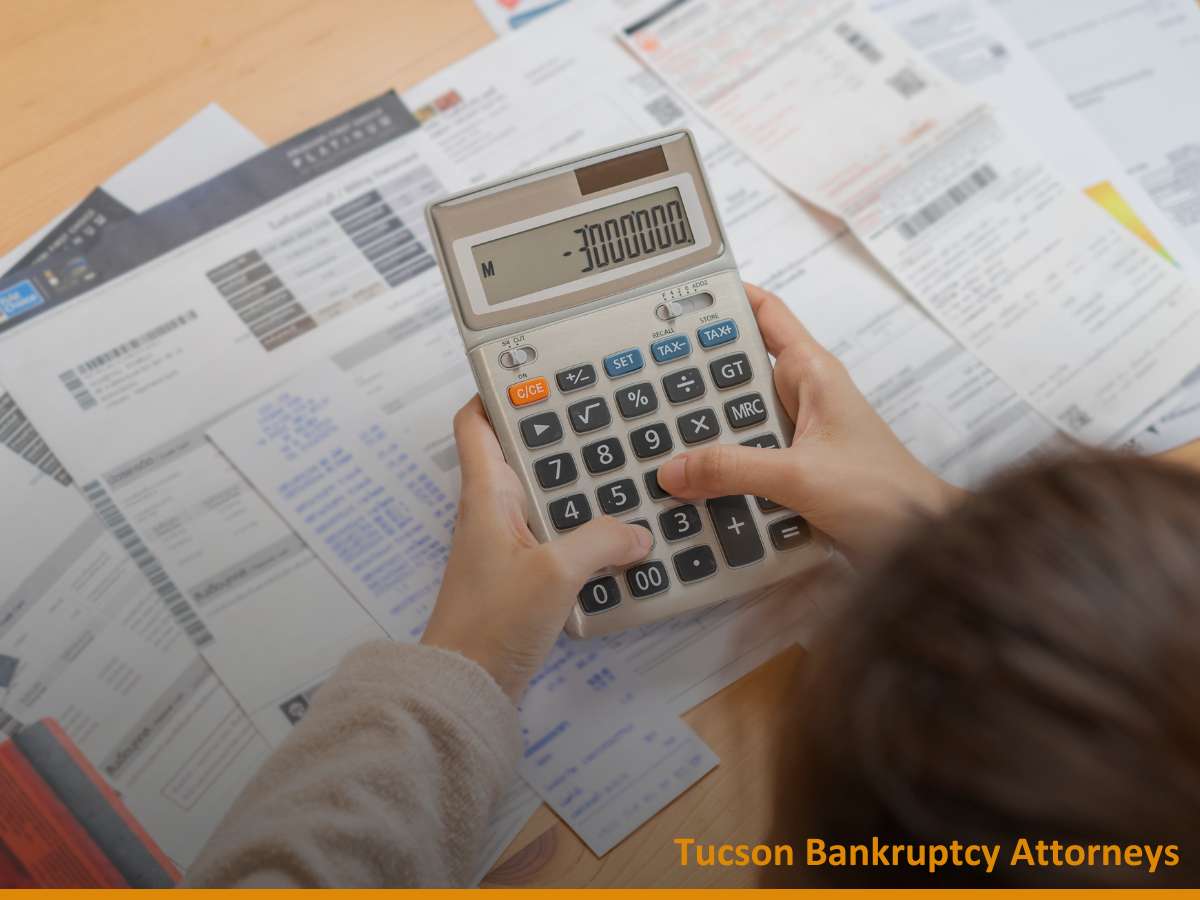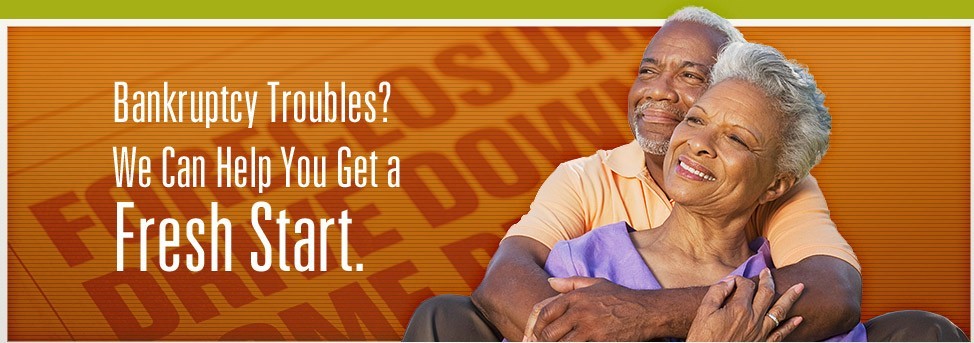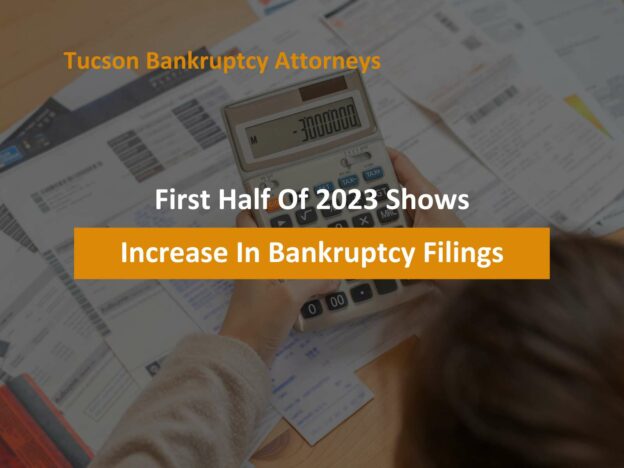It seems like over the past few years, the economy has been tumultuous with no periods of rest and growth. Inflation has increased the price of just about everything, and interest rates only continue to rise. It’s no surprise that upon the start of the second half of 2023, data available from the first half of the year shows an increase in business bankruptcy filings. Chapter 11 bankruptcy gives businesses with debt issues a chance to restructure more profitably while under protection from the court from their creditors. The main difference between a business filing Chapter 11 bankruptcy and filing Chapter 7 bankruptcy is that the business can stay open and continue operations in a Chapter 11 bankruptcy. So while an increase in Chapter 11 bankruptcy filings can signal disruption in the market, there is a silver lining that these businesses haven’t completely given up hope. If you live in the Tucson area and are considering declaring bankruptcy, our firm offers free consultations and experienced guidance. To set up your free consultation, click here or call 520-307-0020.

Chapter 11 Bankruptcy Filing Rates Skyrocket For First Half Of 2023
When July comes around, it allows economists and other experts to examine data from the first half of the year, as well as compare that data to the first halves of previous years. In the first half of 2023, there were 2,973 commercial Chapter 11 bankruptcy filings in the United States. There were 1,766 commercial Chapter 11 bankruptcy filings in the first half of 2022, which is an increase of 68 percent. Subchapter V Chapter 11 bankruptcy filings increased by 55%, and personal Chapter 13 bankruptcy filings increased by 23%.
So what is behind this sharp increase in bankruptcy filings? One thing that makes the market so different from last year is the high-interest rates, as well as the length of time that interest rates have been high. The Federal Reserve has increased rates to a target of 5% to 5.25%. This level has been reached after 10 straight interest rate increases. Interest rates are expected to rise two more times in 2023. Combined with inflation increasing business operating costs, it’s no surprise that many businesses have turned to bankruptcy.
How Does Chapter 11 Bankruptcy Work?
There are several different types of bankruptcy that debtors can file, and they all work differently. Chapter 11 bankruptcy is reported here because it shows how many businesses have filed for bankruptcy with the chance to restructure and continue operating. Both businesses and individuals can declare Chapter 11 bankruptcy. Filing any chapter of bankruptcy triggers the automatic stay, which protects the bankruptcy debtor from its creditors in many ways. Creditors can’t file many types of lawsuits, including evictions, proceed with foreclosures and repossessions, and other forms of collection while the automatic stay is in place.
When the petition is filed and the automatic stay is protecting the debtor, the debtor’s top creditors form a committee. Any major business decisions must be run past the committee before the company can proceed with them. The debtor will also need the committee’s approval on a plan to emerge from bankruptcy. If the creditors and debtor can agree on the plan, the court will sign off on it and it will proceed. If the committee disapproves of the debtor’s plan, the committee can create its own proposed plan. Once the debtor discharges the Chapter 11 bankruptcy, they will resume authority over the entire business, including major business decisions.
Alternatives To Chapter 11 Bankruptcy
If you’re considering bankruptcy, chapter 11 bankruptcy might be superfluous to your needs. Filing Chapter 7 bankruptcy or Chapter 13 bankruptcy could help you achieve your financial goals with fewer resources expended. Perhaps bankruptcy isn’t the right option at all, and a different form of debt relief would be more beneficial to you. Our Tucson bankruptcy team can help you decide with your free consultation- click here or call 520-307-0020 today.
Chapter 7 Bankruptcy
Chapter 7 bankruptcy is the most frequently filed bankruptcy in Arizona and the United States as a whole. Depending on your situation, chapter 7 could be the fastest and most convenient way for you to get rid of your debts. This is most often true when the majority of your debts are unsecured and nonpriority debts. You also must be eligible based on income limitations in the state in which you file. While not technically a barrier to filing Chapter 7 bankruptcy, only certain assets are protected when a debtor files this chapter. The assets must be protected by exemptions, which vary by state, and Arizona doesn’t allow for the use of federal exemptions. The debtor must complete credit counseling courses and attend a 341 Meeting of Creditors- 60 days after that hearing, a Chapter 7 bankruptcy debtor will be eligible for discharge. If you’re considering filing for Chapter 7 bankruptcy in the Tucson area, click here or call 520-307-0020 to see if you qualify.
Chapter 13 Bankruptcy
Chapter 13 bankruptcy works must differently than Chapter 7 because it reworks debts into a payment plan rather than just wiping them away. Unlike Chapter 7 bankruptcy, chapter 13 bankruptcy offers debtors the opportunity to pay off secured debts and priority debts while protected from their creditors by the automatic stay. Chapter 13 bankruptcy either lasts 3 or 5 years, which is dependent on how the debtor’s income compares to the state median income. A Chapter 13 bankruptcy debtor will need to complete the credit counseling courses and 341 Meeting of Creditors just like a Chapter 7 bankruptcy debtor but will need to continue paying on their plan after the hearing to successfully discharge the case.
Debt Negotiation
Instead of filing for bankruptcy, some people choose to negotiate with their creditors to try to reduce the balance of their debts. You can hire an attorney to do this for you, or you can do it on your behalf. If you do negotiate your debts, it’s important to stay on top of your payment plans once they’re in place. If you enter into payment agreements that you still can’t afford, you might just end up in bankruptcy court anyway.
Debt Consolidation
Debt consolidation involves taking out a line of credit with a lower interest rate to pay off the rest of your debts. This will leave you with just one loan payment for your debts rather than juggling several. However, when debts are too high, debt consolidation may simply not be enough. It can also come with significant fees that don’t accompany a bankruptcy filing.
Considering Bankruptcy? Call Our Tucson Bankruptcy Law Firm.
Bankruptcy filings are up, and you may be among the people who could benefit from protection from your creditors and relief from your debts. If you’re considering declaring bankruptcy in the Tucson area, our law firm is here to help. Our Tucson Bankruptcy Lawyers have years of experience helping clients just like you clear debts and build a stronger credit history. Whether your needs are better suited by Chapter 7 or Chapter 13, we can help you navigate your case effectively. When you’re ready to get started with your free consultation, call 520-307-0020 or contact us.
TUCSON BANKRUPTCY ATTORNEYS
2 East Congress Street, Suite #900-6A
Tucson, AZ 85701
Office: (520) 307-0020
Website: https://tucsonbankruptcyattorney.co/

